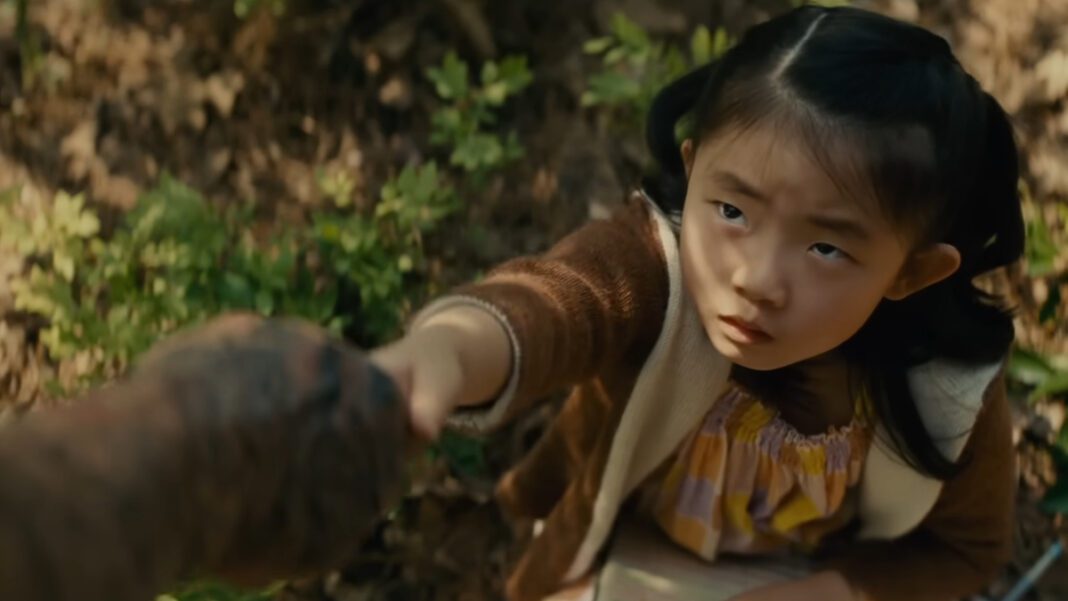Even the most middling cinema can provoke a strong reaction, leave us with questions long after the screening. Knock at the Cabin is one such.
Viewing in a half empty, up-the-stairs-and-far-away Leicester Square screen, the first thing that hits is that Dave Bautista really does have buckets of charisma. He’s shown this already in Blade Runner 2049. Here, emerging from the woods in a pressed white shirt, looming over the tiny and talented Kristen Cui, that wrinkled scalp and bristling mush really do draw you into the story.
The second thing is the bad taste that lingers long after it’s gone.
How it’s told
Like Old before it, Shalamayan conjures a good atmosphere, but the suspense drains away far, far too quickly. The opening scene between Bautista and Cui is terrific, the knock at the cabin sequence pretty good. That’s the first ten minutes.
But as soon as the plot emerges, all that pleasing unnerving Shalamayan stuff fizzles out, leaving something that feels a little stagey and at times plain silly. The sense is that the book this is based on probably delivered in this middle section far better, with that mysterious immersve quality that a paperback has and a movie hasn’t.
During this part of the movie Bautista and his comrades have to demonstrate the weight of their revelations. They want to convince their captives of their best intentions, doing so by showing their prophecy come true on the TV.
Sadly Shalamayan’s direction lends the TV news sequences an oddly phoney air: the newscaster reads out reports about biblical catastrophe with about as much emotion as if it were the Conference League football results. Maybe this is supposed to add to our uncertainty – is Bautista crazy or inspired? But these moments only sabotage the conceit.
Still, a dodgy adaptation wouldn’t keep knocking on my brain for a week afterwards. It is the film’s message that did that.
What it’s saying
What exactly is going on with God in this movie? Bautista and his crew barely mention the man upstairs. Yet the four home/ cabin invaders are described by their captives as both members of a religious cult and ‘four horsemen’.
They come with a message of almighty judgement on humanity. Each has had visions of terrible destruction. They are here to kidnap and murder to appease a jealous deity.
This movie preaches that the mess mankind had made of the world will be fixed by murder on an altar. “Go to this place I have chosen (in the US naturally)” says God, “and slay your loved one. Only by murdering the one you love will you stop me wiping out the whole world. Oh, but most will die anyway, including a huge amount of children.”
Even Abraham was told to stay his hand at the last minute. Here only the full kill will do. This bloodthirsty, extorted sacrifice, is depicted as somehow noble. That is infuriating enough.
But worst of all, in these times of fretting and confusion and complex, worldwide problems, Knock at the Cabin wants to hand responsibility to the supernatural. Carry out some adequately hideous immolation, it promises, and it’ll all be fixed.
Well no. Absolutely not. A magical gathering of seven will not fix the world. If the world ends it will be us that bring it about, a failure of cooperation and empathy and mercy. It will not be some insane old testament spook in the sky who we can appease with a good old fashioned innocent slaying.
How it ends
Whatever you think of the morality – indeed, even if you think it’s absurd to care about the morals of a not particulalry successful Shalamayan movie – the ending makes the experience all the more frustrating.
I told my brother I was going to see it and he informed me that the book ends poorly. Shalamayan, he speculated, was what the book needed. Someone to provide a twist, to cast a cheeky spell at the death to sprinkle doubt on all this rapture codswallop that’s transpired.
Not a bit of it. The movie plays it straight. The world will be destroyed by God, unless he succeeds in blackmailing the purest people on the planet into killing each other. Somehow, we’re supposed to take this squalid act as a spiritual and noble conclusion.
The movie’s final shot could have been our two remaining goodies wandering into the woods and vanishing, much as Bautista appeared. Instead we see them re-enter society, drive to a diner full of dazed people, then drive on again. It feels tacked on, implies an imminent twist that never comes. There is, apparently, no rescuing what has transpired.
